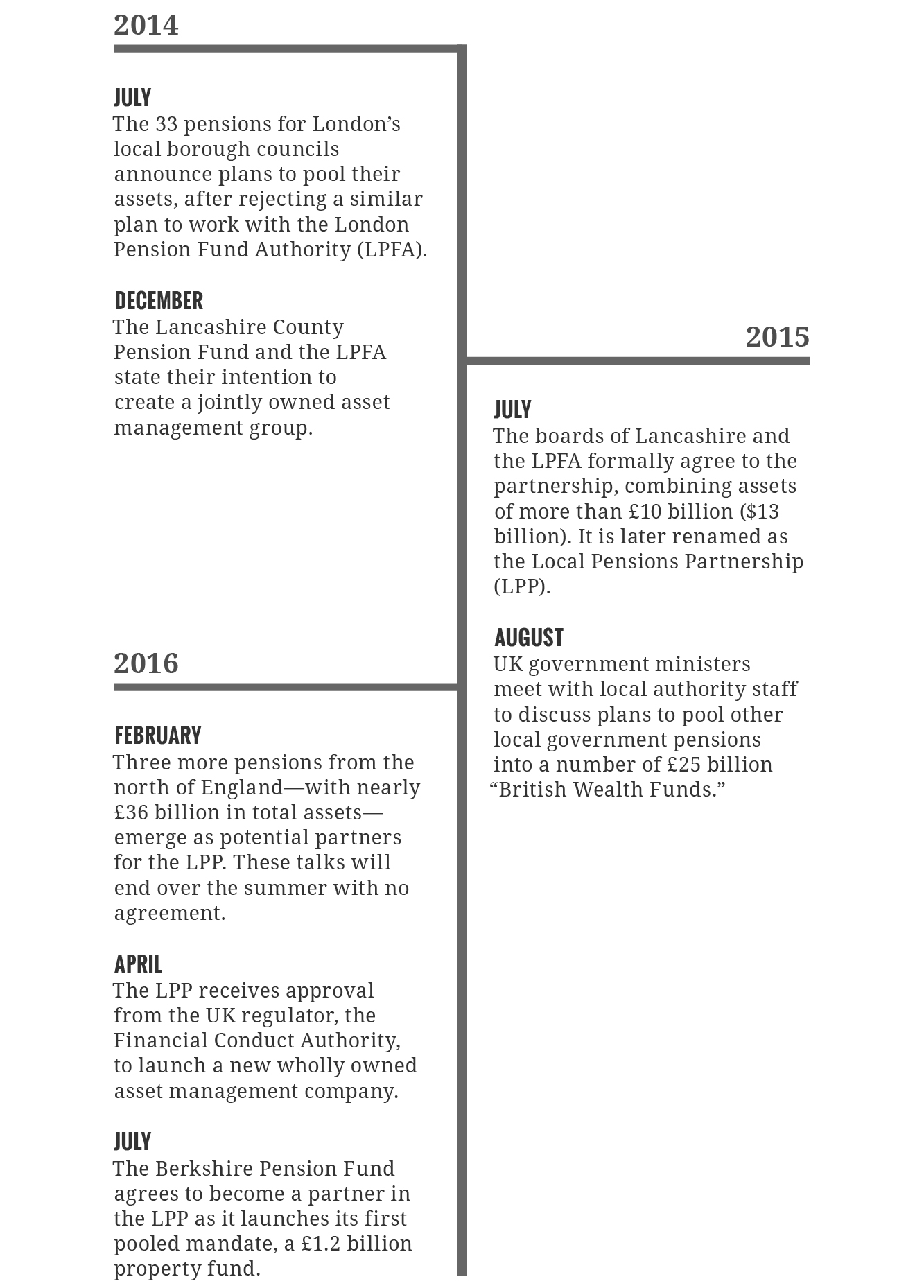 Art by Jasu HuCIO: This is a strange combination of words to utter, but the UK’s local government pension system is really rather interesting right now. How is the Local Pensions Partnership (LPP) shaping up?
Art by Jasu HuCIO: This is a strange combination of words to utter, but the UK’s local government pension system is really rather interesting right now. How is the Local Pensions Partnership (LPP) shaping up?
Sally Bridgeland: The LPP will become more responsible for assets as it develops. We’ve set up the organization in a robust way. We would like to get to the £25 billion ($32 billion) target set by the government, and our structure gives us the ability to have other councils as partners or clients. I would be disappointed if we didn’t hit the target for being fully up and running by 2018.
CIO: You’re in talks with the Berkshire pension fund about joining the LPP. This is a big, established fund with its own ideas and strategies. How do you make sure a partnership like this works and fits with the LPP?
Bridgeland: The most important thing is really having a clear, strong understanding of what success is all about. It’s very easy with a partnership just to focus on the financials, which is kind of a given. If you’re just doing it to save money there are 101 ways to do that. It’s important not to rush into anything.
Having been to two weddings this month, it is like getting to know each other properly in a relationship. You’re getting to know what it’s like to be in a long-term relationship—and that’s not just about the financial side.
CIO: The people are pretty important too.
Bridgeland: Yes, you need to make sure the individuals understand the partnership and who is making which decisions. The LPP has taken a lot of time to decide what flavors of management and engagement with the partnership are available—such as the shareholder approach, as was taken by Lancashire and the London Pension Fund Authority (LPFA). It’s important to understand what that looks like and what it means for all the different kinds of reporting.
CIO: One very important distinction to make is choosing who is making the decisions, especially with multiple people from different funds performing similar functions. Part of your job—and that of the LPP board—presumably is people management?
Bridgeland: Definitely. These funds are transforming from a typical LGPS [London Government Pension Scheme] structure to an investment manager authorized by the Financial Conduct Authority—it’s a big, and exciting, deal. There is a different culture, a different regulatory environment, and it needs different behaviors and additional skills. There are fantastic career opportunities for those who want to upskill. With a new professional and regulatory backdrop you need to make sure you’ve got people who are up for that challenge.
 CIO: You’ve had a number of positions that have prepared you for this challenge.
CIO: You’ve had a number of positions that have prepared you for this challenge.
Bridgeland: I’ve drawn from the variety of roles I’ve been in. At NEST, they have built a top-class administration; at BP, we merged two schemes together; and at Lloyds Banking Group, we’ve merged the trustee companies. [Bridgeland is a trustee at NEST and Lloyds, and was CEO of BP’s pension fund.] I’m drawing from all those experiences as they are relevant to the merger of organizations that we’re doing here. There are a lot of ingredients to put in to get this partnership to gel.
CIO: The LPFA has been talking about formal collaborations for years, and the foundations for the LPP were laid long before there was any decree from government. Did the government have to legislate to force through these pools, or would it have happened naturally?
Bridgeland: If the government hadn’t legislated, the groupings wouldn’t have divided up into these magic £25 billion pools of capital. It’s worth remembering that there is a tension between local and central government: Local politicians are predisposed to doing things locally. Having said that, the LGPS is a strong community across the country and they know the people they like to work with.
To me, it would be a mark of failure if the way these pools form didn’t allow for some flexibility. That requires the ability for funds—and even pools—to cede control, and for some aspects to be outsourced. That might not be consistent with the local authority culture.
CIO: One of the main reasons the UK government has pushed the pooling agenda is to increase the potential for investment in infrastructure. The LPP has a head start with its joint venture with Manchester, but you’re up against some pretty fierce and experienced competition from Canadian pensions and Middle Eastern sovereign wealth funds. How will the LPP and other pools have to adapt?
Bridgeland: I don’t think competitors have changed very much in recent years. The Canadians and sovereign funds have reached a model that’s working well, and there are lessons we can learn from that.
We are also developing separate pools for infrastructure that sit across the main pools—cross-pool pools, if you like. There is the Pension Infrastructure Platform (PIP), and the joint venture with Manchester is already operating. The main difficulty with infrastructure is there is a lot of due diligence work that needs to be done, and yet you may still get outbid. It can be frustrating to see that time wasted, and the next time around you could be tempted to go in for an asset at the wrong price.
CIO: Lastly, no British investor gets away without mentioning the ‘B’ word: Brexit. We know the path to pooling is set, so what effect—if any—will Brexit have?
Bridgeland: The really interesting dynamic is to what extent overseas investors will get cold feet over buying UK infrastructure after Brexit—and that dynamic has changed quite a bit. When the PIP was being set up, the larger private sector funds often felt frustrated by overseas investors coming in and undercutting them, even after they do all their homework. When push comes to shove, it can come down to the bigger political agenda of relationships with other governments—the UK government can’t just give ‘favored nation’ status to the LGPS, and it can’t give guarantees on assets. It will be interesting to see, with all the uncertainties around Brexit, if UK infrastructure is going to become less competitive.
